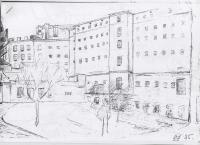I would not want to live my life over again
Lubor Zoufal was born in Prague on April 4th, 1922. He grew up in a family of a police officer and a teacher. He has one brother, Zdeněk. His mother died when he was a small child, and Lubor then lived with his father in the Braník neighbourhood in Prague, where his father worked at a police station. After elementary school, Lubor began attending the grammar school on Křemencova Street. Many of the school’s students were rightist opponents of the Nazis. They were associated in the Union of Czechoslovak Youth, which was an illegal resistance organization. Lubor also introduced his father to this association. In February 1944, Lubor Zoufal was arrested an imprisoned in the Pankrác prison for some time. Later, most of the members of the UCY, including Mr. Zoufal, were transported to Dresden, where he also experienced the Allied air raid on the city in February 1945. After this event, the prisoners were transported again, this time via Meisen to Leipzig. There they remained until the city’s liberation by the American army. After the war, Lubor strove to catch up with all that he had not been able to do due to the war. He studied at a technical college, and in 1948 settled with his family in the region of the Nízké Tatry mountains. In the late 1960s and early 1970s he travelled to Scandinavia and Mongolia.
